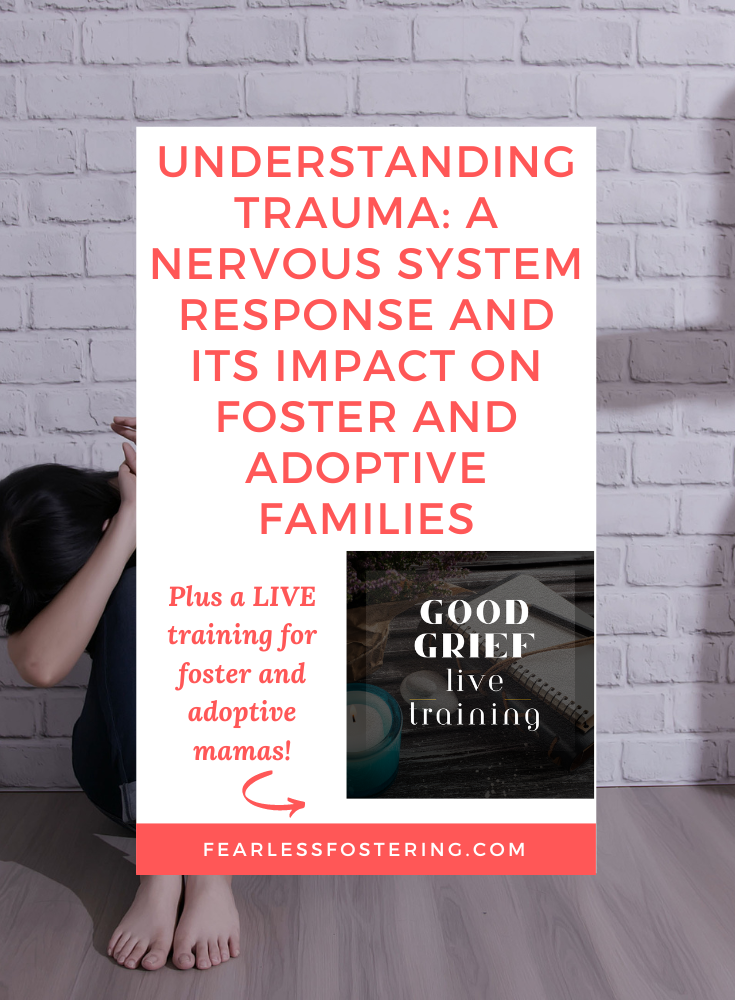
As foster and adoptive mamas, navigating the complex landscape of trauma is an integral part of our parenting journey. The term “trauma” carries weight, often evoking a sense of fear and concern for the well-being of our children. In this episode of the Fearless Fostering podast, we’re going to delve into the clinical definition of trauma, emphasizing its nature as a nervous system response rather than a fixed event. Understanding this crucial distinction allows us to approach parenting from a place of knowledge, compassion, and resilience.
Defining Trauma: A Nervous System Response
Trauma, clinically speaking, is not merely an event but a complex response of the nervous system to overwhelming stress. It’s crucial to grasp that two individuals exposed to the same event may experience it differently, and the impact on their nervous systems can vary significantly.
The Nervous System’s Role in Trauma:
The nervous system, our body’s intricate communication network, responds to stress through the activation of the sympathetic nervous system (fight or flight) or the parasympathetic nervous system (rest and digest). In the context of trauma, the body often remains stuck in a heightened state of alertness, impacting emotional regulation, cognition, and behavior.
The Importance of Distinguishing Trauma from Events
1. Moving Beyond Assumptions:
Understanding trauma as a nervous system response prompts us to move beyond assumptions about a child’s experiences. It’s not possible to definitively know whether a child has experienced trauma solely based on their history. Recognizing this uncertainty encourages a more nuanced and individualized approach to parenting.
2. Parenting from a Place of Knowledge, not Fear:
Fear can be a powerful driving force, especially when we’re concerned about our children’s well-being. However, parenting from a place of fear is counterproductive. By embracing a trauma-informed perspective, we equip ourselves with knowledge and tools to support our children effectively.
The Impact of Trauma on Children from Foster Care and In-Utero Experiences
1. The Fear of Less Than Optimal Outcomes:
Many foster and adoptive parents grapple with the fear that their child may face less than optimal outcomes later in life due to their early experiences. This fear is valid and often stems from a desire to provide the best possible future for our children.
2. Extreme Behavioral Challenges:
The fear of extreme behavioral challenges is a common concern. However, it’s essential to recognize that behavioral challenges may be rooted in trauma responses. A deeper understanding of these responses allows us to approach challenges with empathy and targeted interventions.
The Distinction: Trauma vs. Adverse Childhood Experiences (ACEs)
1. Trauma-Informed Parenting:
Becoming trauma-informed involves acknowledging that trauma can manifest in various ways and recognizing the importance of providing a safe and supportive environment for healing. Trauma-informed parenting emphasizes connection, understanding, and responsiveness.
2. Listening to Each Person’s Unique Experience:
While it’s true that all adoptees and former foster youth have experienced adverse childhood experiences, not all report experiencing trauma. It’s vital to listen to each person’s unique narrative, respecting their individual journey and acknowledging the diversity of responses to challenging circumstances.
Becoming Trauma-Informed Parents
1. Education and Resources:
Invest time in educating yourself about trauma and its impact on children. Utilize resources, attend workshops, and engage with professionals who specialize in trauma-informed care.
2. Building a Supportive Community:
Connect with other foster and adoptive parents who share similar experiences. Building a supportive community provides a space for shared insights, encouragement, and the exchange of effective strategies.
3. Professional Guidance:
Seek guidance from trauma-informed therapists or counselors who can offer personalized strategies for supporting your child’s unique needs. Professional support contributes to a comprehensive and informed approach to parenting.
Understanding trauma as a nervous system response empowers us as foster and adoptive mamas to navigate the challenges of parenting with knowledge and compassion. The distinction between trauma and events allows us to approach our children’s experiences with nuance, acknowledging the individuality of their responses. By becoming trauma-informed, we cultivate resilience, empathy, and effective strategies to support our children on their unique journeys. It’s a journey of continuous learning, adaptation, and, above all, love.
P.S. Daily Deals + Upcoming Live Training:
To add an extra layer of excitement to this month of intentional living, I’m hosting a month-long celebration with daily sales in my shop. What makes it even more thrilling is that the prices are chosen by a random number generator each day! This means you have the chance to snag resources like my Fearless Fostering group coaching program, Embrace the Unknown Support Bundle, and my Foster Mama Starter Kit at unbelievable prices.
I invite you to check the store daily for updated sale prices all this month. The link to everything mentioned in this episode is in the episode description, allowing you to explore these incredible deals as you listen to this message (just make sure you’re not driving!).
+ show Comments
- Hide Comments
add a comment